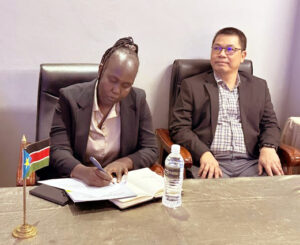
By Lodu William Odiya
The Ministry of Trade and Industry has collaborated with the United Nations Development Programme (UNDP) to developed a comprehensive e-commerce strategy for South Sudan.
In a statement issued the Ministry’s press unit yesterday, Minister Atong Kuol Manyang highlighted that the e-commerce strategy would drive the economic growth and digital inclusion of the country.
She emphasized that the ministry’s proactive approach to creating this policy is a crucial step toward achieving inclusive and sustainable economic growth in South Sudan.
However, Minister Kuol also highlighted challenges that must be overcome to realize the full potential of e-commerce.
“These includes Inadequate Infrastructure: Many rural areas lack reliable internet access and a consistent power supply, which are essential for digital commerce” statement stated.
“High Internet Costs: The high cost of internet services makes it difficult for businesses and consumers to fully engage in online transactions” she noted.
According to the statement, many businesses struggle to secure the necessary funding to launch or expand their online ventures.
The statement also underlined that the primary objective of this new e-commerce policy is to provide a clear roadmap for implementing and adopting e-commerce throughout South Sudan.
“The strategy aims to build the capacity of Micro, Small, and Medium-sized Enterprises (MSMEs) to participate in the digital economy by Providing training on the e-commerce ecosystem and digital marketing” it noted.
She also emphasized that the strategy also aimed at developing and operationalizing digital marketing platforms.
“Connecting MSMEs to various e-commerce platforms and linking them to domestic and cross-border opportunities, particularly those offered by the African Continental Free Trade Area (AfCFTA)” she stated in the statement.
Kuol added that the initiative also seeks to align South Sudan’s e-commerce regulations with those of the East African Community (EAC), which will facilitate regional trade and harmonize standards.
Minister Kuol stressed that the success of this policy hinges on robust public-private partnerships.
“The government cannot build a digital economy alone. Close collaboration with the private sector, development partners, and civil society is essential to create an ecosystem that fosters innovation and mutual growth” she stated.
She underscored by working together, the government and its partners can provide entrepreneurs with the skills and capital needed to compete in the digital market.
“This includes offering training on online marketing, secure digital payments, and effective customer outreach. The private sector’s agility and expertise are vital in complementing the government’s efforts to promote market access” she stressed.
The minister highlighted also that collective investment and innovation are critical for infrastructure development, including expanding broadband internet access and also ensuring a consistent power supply.
“These joint efforts between public and private entities are necessary to build a solid foundation for a successful digital economy and make essential services affordable for all South Sudanese citizens, including those in poor and rural communities” she stated.
She stated that the recent endorsement of the Competition Bill 2023 further demonstrated the government’s commitment to creating a fair and inclusive business environment.
“While challenges remain, these are opportunities for continued collaboration, innovation, and investment, Minister Kuol stated. The future of trade is digital, and South Sudan is ready to lead and must not be left behind” she added.




